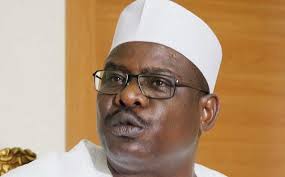Senator Ali Ndume has criticized the heavy use of police escorts and long convoys by top government officials, including President Bola Tinubu, saying the practice contributes to growing insecurity in the country. Ndume, who represents Borno South in the Senate, made the comments on Thursday during an interview on Politics Today, a current affairs programme on Channels Television.
The senator said many political officeholders move around with security details far larger than necessary, leaving fewer police officers available to protect ordinary Nigerians. He described the situation as wasteful and unfair, especially at a time when the country is struggling with insecurity in several regions.
Ndume said the number of police officers attached to VIPs—including governors, ministers, senior lawmakers and business moguls—has become excessive. According to him, this practice reduces the number of personnel available for community policing and general law enforcement.
Ndume said he recently visited a colleague in the National Assembly and was shocked to see “more than 10 policemen” attached to him, even though the colleague was junior to him in rank. He argued that many VIPs move around with convoys so large that one might mistake them for the President or Vice President.
“You can see even the President. The convoy that the President goes about with is too much,” Ndume said. “Secure the place, and when the President goes, you withdraw. Secure Abuja, and the President can even drive out himself.”
He added that when the government focuses security resources on protecting individuals rather than securing communities and public spaces, the ordinary citizen becomes exposed and vulnerable.
“When you secure personalities, and this is what is happening in Nigeria, then others—common people, as we call them—become vulnerable, and we don’t care,” he said. “But if you secure Abuja, then you can drive at night. And let me tell you, this is what is happening in most countries.”
For many years, public officeholders in Nigeria have moved with long convoys, sirens, and heavy security. This trend worsened over time as kidnappings, terrorism, and bandit attacks increased across the country.
In the Fourth Republic alone, several high-profile political assassinations and attempted attacks made many politicians adopt larger convoys. However, critics say the practice has grown far beyond what is reasonable. Today, many VIPs—including former officials, traditional rulers, and wealthy businessmen—move around with escorts that the average Nigerian rarely sees.
A 2021 estimate suggested that nearly 100,000 police officers might be attached to individuals, companies, and private establishments. Although the exact figure is unclear today, the trend remains a major concern.
Ndume’s comments came just days after President Tinubu directed the Inspector-General of Police to withdraw police officers from VIP escort and guard duties and redeploy them to core policing roles. The Presidency said the move was necessary to strengthen security nationwide and make officers available for proper law enforcement.
Bayo Onanuga, Special Adviser to the President on Information and Strategy, said the decision was part of ongoing police reforms that aim to improve security operations. He explained that under the new directive, VIPs will be encouraged to hire private security if they need additional protection.
Onanuga noted that the President wants a police force that focuses on investigations, patrols, intelligence gathering and public safety, rather than serving as bodyguards for privileged Nigerians.
Ndume supported the President’s decision, saying the withdrawal of police escorts is long overdue. He stressed that Nigeria needs a policing system where citizens feel safe to travel at night, move freely across states, and conduct business without fear.
During the interview, the senator said security should be about making the entire country safe, not just protecting politicians or influential individuals. He pointed out that even if VIPs travel with large convoys, this does not solve the larger security problems affecting daily life.
“If you secure the place, the President can move freely,” Ndume said. “But when we keep securing individuals, we ignore the vulnerability of millions of citizens.”
He added that citizens have the right to feel safe in their homes, on the streets, and in their communities. According to him, Nigeria’s current focus on VIP protection puts ordinary people at greater risk, especially in rural areas where banditry and kidnapping have become widespread.
Nigeria has battled serious security problems for more than a decade. Boko Haram and ISWAP continue to launch attacks in the North-East; bandits operate in Zamfara, Katsina, Niger, Kaduna and parts of Kebbi; and kidnappings for ransom have spread across the country.
Communal clashes, herder-farmer conflicts, oil theft, and armed robbery further complicate the security picture. Many Nigerians blame the government for failing to reform the police and security forces quickly enough.
Ndume’s comments have sparked mixed reactions among Nigerians. Some citizens praised him for speaking boldly about an issue many have long complained about. They say long convoys often intimidate road users and cause unnecessary traffic.
Others argue that given the security situation in the country, top government officials need strong protection to prevent assassinations or attacks.
A civil society advocate in Abuja, Aisha Idris, said, “Reducing VIP convoys is a good step, but the government must also address the root causes of insecurity. People need jobs, food, and community policing.”
A commercial driver in Lagos, John Ugwu, said, “Whenever a governor or minister passes, we all have to stop and wait. Sometimes 30 or 40 cars will pass. It is too much.”
Senator Ndume urged the government to focus more on national security reforms, police training and better intelligence gathering. He said Nigeria must adopt the security practices seen in other countries where the environment is made safe so that VIPs do not need heavy protection.
“We need to secure Nigeria, not only VIPs,” he said. “When the environment is safe, everybody—including the President—can move freely.”

